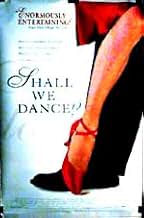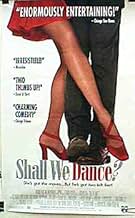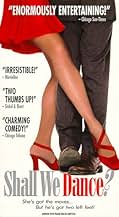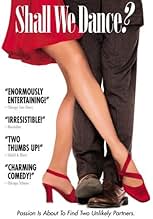A successful but unhappy Japanese accountant finds the missing passion in his life when he begins to secretly take ballroom dance lessons.A successful but unhappy Japanese accountant finds the missing passion in his life when he begins to secretly take ballroom dance lessons.A successful but unhappy Japanese accountant finds the missing passion in his life when he begins to secretly take ballroom dance lessons.
- Awards
- 55 wins & 7 nominations total
Eri Watanabe
- Toyoko Takahashi
- (as Eriko Watanabe)
Reiko Kusamura
- Tamako Tamura
- (as Raiko Kusamura)
- Director
- Writer
- All cast & crew
- Production, box office & more at IMDbPro
Featured reviews
This movie opened in Korea four years later than in Japan due to the now-defunct ban on Japanese pop culture in Korea. But the audiences in Korea were just as enthralled and enchanted by the story as the rest of the world was.
Like Japan, there are many salarymen in Korea who are also facing a mid-life crisis. After the movie premiered in Seoul, dance studios were reporting up to a 50-percent increase in the number of new students.
I took two years of jazz dance during college, and have seen Strictly Ballroom and Dance With Me. But this movie was the driving force behind me finally signing up for ballroom dance (called dancesport in Korea) lessons.
Mr. Aoki was hilarious as the employee who led a double life unbeknownst to his colleagues. It was also interesting to find out the reasons why the other students took lessons.
I too would have taken classes just to get close to the sexy dance instructor alone.
This movie is a perfect ten in my book.
Like Japan, there are many salarymen in Korea who are also facing a mid-life crisis. After the movie premiered in Seoul, dance studios were reporting up to a 50-percent increase in the number of new students.
I took two years of jazz dance during college, and have seen Strictly Ballroom and Dance With Me. But this movie was the driving force behind me finally signing up for ballroom dance (called dancesport in Korea) lessons.
Mr. Aoki was hilarious as the employee who led a double life unbeknownst to his colleagues. It was also interesting to find out the reasons why the other students took lessons.
I too would have taken classes just to get close to the sexy dance instructor alone.
This movie is a perfect ten in my book.
Watched this last night and was bowled over by the heartfelt story line, the excellent character development, and the good karmic vibe emanating from the acting and movie as a whole.
Without giving away too much of the plot, it begins with an ordinary joe who commutes to his office job every day who becomes inspired to take dance lessons. Along the way the protagonist and the assorted characters he meets in his quest to be smooth on the dance floor learn lessons about others and about themselves.
The story has a prologue about what dancing in Japan symbolizes sociologically, so it isn't exactly as simple to learn to dance in Japan as it is here in the U.S.
The film is lighthearted; you'll laugh out loud at some of the sight gags. Yet it is also dignified in a way hard to describe. All of the film's characters are taken seriously, as they are, and none are diminished because of their "imperfections."
I've been thinking about taking social dance classes with some friends. It just so happened a friend lent me the video on learning to dance. Is this synchronous or what? I think so because now I'm really geeked to give it a try.
Watch this wonderful family film (small children might not get it, but teens certainly would) and smile at the genuine caring you see shown in it time and again.
Why they would make a remake of Shall We Dance is a mystery, as it is perfect as-is.
Without giving away too much of the plot, it begins with an ordinary joe who commutes to his office job every day who becomes inspired to take dance lessons. Along the way the protagonist and the assorted characters he meets in his quest to be smooth on the dance floor learn lessons about others and about themselves.
The story has a prologue about what dancing in Japan symbolizes sociologically, so it isn't exactly as simple to learn to dance in Japan as it is here in the U.S.
The film is lighthearted; you'll laugh out loud at some of the sight gags. Yet it is also dignified in a way hard to describe. All of the film's characters are taken seriously, as they are, and none are diminished because of their "imperfections."
I've been thinking about taking social dance classes with some friends. It just so happened a friend lent me the video on learning to dance. Is this synchronous or what? I think so because now I'm really geeked to give it a try.
Watch this wonderful family film (small children might not get it, but teens certainly would) and smile at the genuine caring you see shown in it time and again.
Why they would make a remake of Shall We Dance is a mystery, as it is perfect as-is.
Shohei Sugiyama is a dispirited salaryman who has lost his lust for life. Despite having a wife and daughter, a nice house and a steady job, depression grips him. One day, while riding the train home, he spots a beautiful, forlorn looking woman-Mai Kishikawa- gazing out the window of a dance studio. Although not really interested in dance, Sugiyama plucks up enough courage to take lessons in the studio, in order to get to know her. Under the tuition of the elderly Tamako Tamura, however, he begins to fall in love with dancing, finding meaning in his life once more.
Written and directed by Masayuki Suô, 'Shall We Dance?' is a heartwarming comic-drama that works on multiple levels. Funny and sad both, it can be viewed as a critique of rigid, conformist Japanese society, which is contrasted with the expressive, liberating Western dance practiced in the studio. It also shows how one's life can become better and more meaningful by following a dream or goal, and how purpose can be restored by doing so. Conversely, it also illustrates how communication and honesty are vital for relationships to prosper, shown through the clashes and confusions between Sugiyama and his wife Masako, as well as those between Mai and her old dance partner.
Above all else, it is a love letter to ballroom dancing, and those that practice it. Sugiyama's stale existence is given colour and excitement after he joins the studio. Not only does he have something to live for, but he begins meeting people who genuinely affect him. Whether it is his mentor Tamura, or his friend Tomio Aoki, everyone he meets while dancing brings something to his life, not least of which is Mai, who- perhaps inadvertently- teaches him to love again. Suô's screenplay is full of depth, as well as great, witty dialogue, and is compelling and captivating.
Naoki Kayano's cinematography is stylish and evocative, contributing to the mood of the piece. He captures the dance sequences with verve, heightening the emotion with his tracking shots and snappy zooms. He contrasts the dull, dour tones of Sugiyama's office and home with the bright, colourful hues of the dance studio and the ballroom competitions, reflecting the different worlds that Sugiyama inhabits. Lush and memorable, Kayano's work complements the graceful and energetic movements of the dancers, creating a remarkable visual spectacle.
Moreover, the expertly choreographed dancing is incredible to behold. The film makes ballroom dancing- when learnt properly- look like the most beautiful expression of emotion on earth. The soundtrack is stirring, making excellent use of songs by the likes of Rogers and Hammerstein, while Yoshikazu Suo's original score complements the narrative astutely. Furthermore, Kyôko Heya's production design- in conjunction with Kayano's visuals- is full of contrast and realism, bolstering the film's impact.
Koji Yakusho stars as Sugiyama, opposite Tamiyo Kusakari as Mai, Reiko Kusamura as Tamura and Naoto Takenaka as Aoi. Yakusho, as always, makes the character compelling and complex, bringing much humour to the role. We empathise with Sugiyama, and are on his side the whole way through. Kusakiri, a professional dancer in her first acting role, is excellent, displaying Mai's reserve and inner feelings marvellously. Kusamura nearly steals the show as the kind-hearted Tamura, while Takenaka is a source of constant delight as the Salsa-dance loving Aoi. In addition, Hideko Hara does strong work as Sugiyama's wife Masako, sharing a great chemistry with Yakusho.
In conclusion, Masayuki Suô's 'Shall We Dance?' is a delightful, funny film both poignant and powerful. With a strong screenplay full of humorous dialogue and scenes, striking cinematography and production design and a memorable score, it works on many levels. Boasting terrific performances from all in the cast- especially those of Koji Yakusho, Tamiyo Kusakiri and Reiko Kusamura- and featuring much expertly choreographed ballroom dancing, if the question is 'Shall We Dance?', the answer must surely be yes.
Written and directed by Masayuki Suô, 'Shall We Dance?' is a heartwarming comic-drama that works on multiple levels. Funny and sad both, it can be viewed as a critique of rigid, conformist Japanese society, which is contrasted with the expressive, liberating Western dance practiced in the studio. It also shows how one's life can become better and more meaningful by following a dream or goal, and how purpose can be restored by doing so. Conversely, it also illustrates how communication and honesty are vital for relationships to prosper, shown through the clashes and confusions between Sugiyama and his wife Masako, as well as those between Mai and her old dance partner.
Above all else, it is a love letter to ballroom dancing, and those that practice it. Sugiyama's stale existence is given colour and excitement after he joins the studio. Not only does he have something to live for, but he begins meeting people who genuinely affect him. Whether it is his mentor Tamura, or his friend Tomio Aoki, everyone he meets while dancing brings something to his life, not least of which is Mai, who- perhaps inadvertently- teaches him to love again. Suô's screenplay is full of depth, as well as great, witty dialogue, and is compelling and captivating.
Naoki Kayano's cinematography is stylish and evocative, contributing to the mood of the piece. He captures the dance sequences with verve, heightening the emotion with his tracking shots and snappy zooms. He contrasts the dull, dour tones of Sugiyama's office and home with the bright, colourful hues of the dance studio and the ballroom competitions, reflecting the different worlds that Sugiyama inhabits. Lush and memorable, Kayano's work complements the graceful and energetic movements of the dancers, creating a remarkable visual spectacle.
Moreover, the expertly choreographed dancing is incredible to behold. The film makes ballroom dancing- when learnt properly- look like the most beautiful expression of emotion on earth. The soundtrack is stirring, making excellent use of songs by the likes of Rogers and Hammerstein, while Yoshikazu Suo's original score complements the narrative astutely. Furthermore, Kyôko Heya's production design- in conjunction with Kayano's visuals- is full of contrast and realism, bolstering the film's impact.
Koji Yakusho stars as Sugiyama, opposite Tamiyo Kusakari as Mai, Reiko Kusamura as Tamura and Naoto Takenaka as Aoi. Yakusho, as always, makes the character compelling and complex, bringing much humour to the role. We empathise with Sugiyama, and are on his side the whole way through. Kusakiri, a professional dancer in her first acting role, is excellent, displaying Mai's reserve and inner feelings marvellously. Kusamura nearly steals the show as the kind-hearted Tamura, while Takenaka is a source of constant delight as the Salsa-dance loving Aoi. In addition, Hideko Hara does strong work as Sugiyama's wife Masako, sharing a great chemistry with Yakusho.
In conclusion, Masayuki Suô's 'Shall We Dance?' is a delightful, funny film both poignant and powerful. With a strong screenplay full of humorous dialogue and scenes, striking cinematography and production design and a memorable score, it works on many levels. Boasting terrific performances from all in the cast- especially those of Koji Yakusho, Tamiyo Kusakiri and Reiko Kusamura- and featuring much expertly choreographed ballroom dancing, if the question is 'Shall We Dance?', the answer must surely be yes.
A good movie with an outstanding story. Many assume that the movie is a love story from the typical Hollywood style: boy meets girl love affair. This is not. It is a story of a man who forgot to love life. His everyday life has become routine and he has no idea where his life is taking him. He has a house and car payment and a family of 3 that he has to provide for. From home, he takes his bicycle to the train and then he takes the train to work. Everyday, same old, same old. Then, one day he sees something that turns his world up-side-down. Dancing? A new way to express himself, a way to communicate with others and show his true colors. The passion he finds is not in a woman or mere lust, but in living life to the fullest. He begins to stop and look around him as he uses dancing to live. A terrific cast of funny and heart filled characters. This is not a movie about Japan or the Japanese, although it does take place in Japan and the cast is made up of Japanese. The setting and the plot of this movie is timeless.
Okay. As you can see this is one of my favorite if not favorite films. This is a character drama which is absolutely hilarious. The main character is a business man who is stuck in a "same thing, different day" mentality. He sees a woman looking melancholy out a window of a dance studio from his train everyday and wonders about her and decides to find out more about her. He decides to join the dance class only to find out she is not the instructor. From there he bonds with four other dancers and learns to enjoy dancing as well as finding out about the mysterious woman.
There is no gratuitous (or any) sex involved, just how a small group of people learn how friendships are formed and developed.
This film was remade with Richard Gere and Jennifer Lopez and the new one while appealing is nowhere as enjoyable as the original. The movie never made it big in America because it was not eligible for the Oscars since it was broadcast on television in Japan (movies cannot be released on TV or they are disqualified for Oscar nominations). It did win numerous awards in Japan for best film, cast, director etc for their "Oscar" awards.
There is no gratuitous (or any) sex involved, just how a small group of people learn how friendships are formed and developed.
This film was remade with Richard Gere and Jennifer Lopez and the new one while appealing is nowhere as enjoyable as the original. The movie never made it big in America because it was not eligible for the Oscars since it was broadcast on television in Japan (movies cannot be released on TV or they are disqualified for Oscar nominations). It did win numerous awards in Japan for best film, cast, director etc for their "Oscar" awards.
Did you know
- TriviaIn the first scene, a man's shoe in close-up plunges into a black pool in the street. This symbolizes the world renowned Ballroom Dancing Competition in Blackpool, England, referenced later in the film.
- Quotes
Shohei Sugiyama: At my age, it's embarrassing to say so, but every day I feel so alive.
- Alternate versionsOriginal Japanese version (pre-Miramax) runs 136 minutes and is available on Hong Kong laseridisc with English and Chinese subtitles.
- How long is Shall We Dance??Powered by Alexa
Details
Box office
- Gross US & Canada
- $9,511,697
- Opening weekend US & Canada
- $12,606
- Jun 1, 2025
- Gross worldwide
- $9,511,697
Contribute to this page
Suggest an edit or add missing content


























